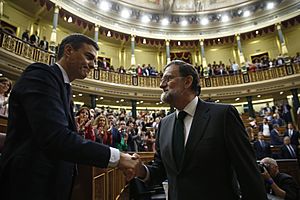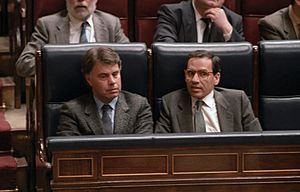Motions of no confidence in Spain facts for kids

A motion of no confidence in Spain is a special way for the parliament to show it no longer trusts the leader of the government. This leader is called the Prime Minister (or "President of the Government"). If the motion passes, the Prime Minister has to resign.
In Spain, this motion is "constructive." This means that when politicians propose a motion to remove the current Prime Minister, they must also suggest a new person to take their place. It's also "continuist," meaning it doesn't automatically lead to new elections. The normal election schedule stays the same.
The idea of a motion of no confidence for the national Prime Minister is written in the Spanish Constitution of 1978. So far, there have been six such motions in the main parliament, called the Congress of Deputies. These were against Prime Ministers Suárez (1980), González (1987), Rajoy (2017 and 2018), and Sánchez (2020, 2023). Only one of these motions was successful. This happened on June 1, 2018, when the motion against Mariano Rajoy passed. Pedro Sánchez then became the new Prime Minister.
Motions of no confidence can also happen in the parliaments of Spain's different regions, called "autonomous communities." Each region has its own rules for this. Across all regions and autonomous cities, 31 motions have been presented, and 9 of them were successful.
Contents
How a Motion of No Confidence Works
The rules for a motion of no confidence against the national Prime Minister are in the Spanish Constitution and the rules of the Congress of Deputies.
- Who can propose it? At least one-tenth of the members of the Congress of Deputies must propose it. This means about 35 members.
- What must it include? The motion must name a candidate who they want to become the new Prime Minister.
After the motion is presented, the Congress leaders check it. They have up to 7 days to make sure it follows all the rules. Once it's approved, there's a two-day period where other groups can propose their own alternative motions. These must also be signed by 35 members and include a new Prime Minister candidate. The debate on these motions cannot start until this two-day period is over.
Next, the leader of the Congress sets a date for the debate and vote. This must happen within 20 days. However, if the national budget is being discussed, the 20-day countdown starts after the budget is finished. The vote cannot happen until at least five days after the motion was first presented.
To pass, a motion of no confidence needs an absolute majority of votes. This means more than half of all the members of the Congress of Deputies must vote "yes." If the motion passes, the current government must resign within 24 hours. The King of Spain then officially appoints the new Prime Minister (the candidate named in the motion) within 15 days.
If a motion of no confidence does not pass, the groups who proposed it cannot try again during the same parliamentary session.
While a motion of no confidence is being processed, the Prime Minister cannot dissolve the Congress and call for early elections. This rule stops the Prime Minister from avoiding the vote by simply ending the parliament. However, the Prime Minister can choose to resign voluntarily. If they resign, they might stay on as a temporary leader, but the Congress can then choose a new Prime Minister with a simple majority vote.
Past Motions of No Confidence
So far, there have been six motions of no confidence at the national level. There have also been many in the regional parliaments. Here are the lists:
In the Congress of Deputies
| Date | Prime Minister | Candidate | Result (required to win) |
Ref. | |||||
|---|---|---|---|---|---|---|---|---|---|
| 30 May 1980 |  |
Adolfo Suárez (UCD) |  |
Felipe González (PSOE) | 152–166 (176) |
Rejected | |||
| 30 Mar 1987 |  |
Felipe González (PSOE) |  |
Antonio Hernández Mancha (AP) | 67–194 (176) |
Rejected | |||
| 14 Jun 2017 |  |
Mariano Rajoy (PP) |  |
Pablo Iglesias (Podemos) | 82–170 (176) |
Rejected | |||
| 1 Jun 2018 |  |
Mariano Rajoy (PP) |  |
Pedro Sánchez (PSOE) | 180–169 (176) |
Approved | |||
| 22 Oct 2020 |  |
Pedro Sánchez (PSOE) |  |
Santiago Abascal (Vox) | 52–298 (176) |
Rejected | |||
| 22 Mar 2023 |  |
Pedro Sánchez (PSOE) |  |
Ramón Tamames (INDEP) Proposed by Vox |
53–201 (175) |
Rejected | |||
In Autonomous Parliaments
The Balearic Islands and Andalusia are the only regions where a motion of no confidence has never been proposed.
| Date | Autonomous community |
Regional president | Candidate | Result (required to win) |
Ref. | |||||
|---|---|---|---|---|---|---|---|---|---|---|
| 1 Oct 1982 | Catalonia |  |
Jordi Pujol (CDC) |  |
Josep Benet (PSUC) | 21–56 (68) |
Rejected | |||
| 23 Sep 1987 | Galicia |  |
Gerardo Fernández Albor (AP) |  |
Fernando González Laxe (PSdG) | 40–29 (36) |
Approved | |||
| 21 Jun 1989 | Community of Madrid |  |
Joaquín Leguina (PSOE) |  |
Alberto Ruiz-Gallardón (PP) | 48–40 (49) |
Rejected | |||
| 8 Jan 1990 | La Rioja |  |
Joaquín Espert (PP) |  |
José Ignacio Pérez Sáenz (PSOE) | 17–13 (17) |
Approved | |||
| 5 Dec 1990 | Cantabria |  |
Juan Hormaechea (UPCA) |  |
Jaime Blanco (PSOE) | 26–12 (20) |
Approved | |||
| 31 Mar 1993 | Canary Islands |  |
Jerónimo Saavedra (PSOE) |  |
Manuel Hermoso (CC) | 31–23 (31) |
Approved | |||
| 1 Jul 1993 | Cantabria |  |
Juan Hormaechea (UPCA) |  |
Jaime Blanco (PSOE) | 18–21 (20) |
Rejected | |||
| 15 Sep 1993 | Aragon |  |
Emilio Eiroa (PAR) |  |
José Marco (PSOE) | 34–33 (34) |
Approved | |||
| 5 Jan 1994 | Cantabria |  |
Juan Hormaechea (UPCA) |  |
Jaime Blanco (PSOE) | 18–17 (20) |
Rejected | |||
| 21 Dec 1994 | Aragon |  |
José Marco (PSOE) |  |
Emilio Eiroa (PAR) | 32–30 (34) |
Rejected | |||
| 10 Mar 1999 | Asturias |  |
Sergio Marqués (URAS) |  |
Ovidio Sánchez (PP) | 16–6 (23) |
Rejected | |||
| 5 Oct 2000 | Basque Country |  |
Juan José Ibarretxe (PNV) |  |
Nicolás Redondo (PSE–EE) | 32–29 (38) |
Rejected | |||
 |
Carlos Iturgaiz (PP) | 32–29 (38) |
Rejected | |||||||
| 29 Jan 2001 | Galicia |  |
Manuel Fraga (PP) |  |
Xosé Manuel Beiras (BNG) | 18–41 (38) |
Rejected | |||
| 18 Oct 2001 | Catalonia |  |
Jordi Pujol (CDC) |  |
Pasqual Maragall (PSC) | 55–68 (68) |
Rejected | |||
| 7 Nov 2001 | Canary Islands |  |
Román Rodríguez (CC) |  |
Juan Carlos Alemán (PSOE) | 19–39 (31) |
Rejected | |||
| 12 Dec 2002 | Galicia |  |
Manuel Fraga (PP) |  |
Emilio Pérez Touriño (PSdeG) | 34–41 (38) |
Rejected | |||
 |
Xosé Manuel Beiras (BNG) | 34–41 (38) |
Rejected | |||||||
| Withdrawn 11 Mar 2005 |
Catalonia |  |
Pasqual Maragall (PSC) |  |
Josep Piqué (PP) | N/A | Withdrawn | |||
| 4 Oct 2006 | Valencian Community |  |
Francisco Camps (PP) |  |
Joan Ignasi Pla (PSPV) | 35–47 (45) |
Rejected | |||
| 18 Apr 2013 | Navarre |  |
Yolanda Barcina (UPN) |  |
Juan Carlos Longás (Aralar–NaBai) | 18–23 (26) |
Rejected | |||
| 14 May 2014 | Extremadura |  |
José Antonio Monago (PP) |  |
Guillermo Fernández Vara (PSOE) | 30–32 (33) |
Rejected | |||
| Withdrawn 4 Apr 2017 |
Region of Murcia |  |
Pedro Antonio Sánchez (PP) |  |
Rafael González Tovar (PSOE) | N/A | Resigned | |||
| 8 Jun 2017 | Community of Madrid |  |
Cristina Cifuentes (PP) |  |
Lorena Ruiz-Huerta (Podemos) | 27–64 (65) |
Rejected | |||
| Withdrawn 25 Apr 2018 |
Community of Madrid |  |
Cristina Cifuentes (PP) |  |
Ángel Gabilondo (PSOE) | N/A | Resigned | |||
| 7 Oct 2019 | Catalonia |  |
Quim Torra (JuntsxCat) |  |
Lorena Roldán (Cs) | 40–76 (68) |
Rejected | |||
| Dismissed 11 Mar 2021 |
Community of Madrid |  |
Isabel Díaz Ayuso (PP) |  |
Mónica García (Más Madrid) | N/A | Dismissed | |||
 |
Ángel Gabilondo (PSOE) | N/A | Dismissed | |||||||
| 18 Mar 2021 | Region of Murcia |  |
Fernando López Miras (PP) |  |
Ana Martínez Vidal (Cs) | 21–23 (23) |
Rejected | |||
| 22 Mar 2021 | Castile and León |  |
Alfonso Fernández Mañueco (PP) |  |
Luis Tudanca (PSOE) | 37–41 (41) |
Rejected | |||
Images for kids
See also
 In Spanish: Moción de censura (España) para niños
In Spanish: Moción de censura (España) para niños
 | Madam C. J. Walker |
 | Janet Emerson Bashen |
 | Annie Turnbo Malone |
 | Maggie L. Walker |





